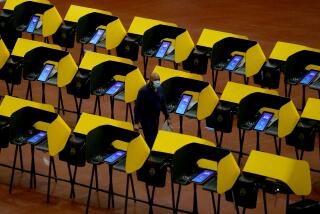Are the State’s Voters Up to the Task?
- Share via
California’s recall election has converted a serious political and economic crisis into a spectacle, packing the promise of more recalls and chaos to come. Exactly how the melodrama will play itself out today is up to the most powerful political entity in the state -- the voters.
Are they up to the task? Exit polls and nationwide telephone surveys make it clear that most voters base their decisions on “fast-food” information sources: bumper stickers, sound bites, TV news and ads. That makes many pundits despair. They believe that more is always better when it comes to political information and that the only competent voters are the ones who know all the facts.
But that’s not what the data show.
To test competency, political scientists compare two groups of voters that are alike in many ways (such as age, income, education, gender, religious affiliation, marital status and place of residence) but different in one important way: the amount of detailed information they take with them to the polls. One group of voters can cite chapter and verse about candidates and issues, the other cannot.
What we’ve discovered is that the two groups often vote in remarkably similar ways. And these results imply that many voters who act without detailed information about politics are as competent as their well-informed counterparts. Put another way, if we later give less-informed voters the kinds of information that they lacked, they usually continue to vote in the same way they did before.
What makes this possible is a particular kind of information -- the shortcut. Citizens consider all kinds of shortcuts when it comes to voting: the number of yard cards popping up in their neighborhoods, tips from friends and how much they like a particular slogan. But surveys, interviews and laboratory experiments show that the most effective shortcuts, the ones that make voters “competent” are party affiliation and endorsements -- the support of well-known interest groups and individuals. It’s fast-food information, but it turns out to be an excellent substitute for detailed facts and figures.
If voters know, for example, that the National Rifle Assn. or the Sierra Club wants the same things politically that they do, and if they know that this group contains people who are very well-informed about politics, then following the group’s endorsement can lead the voters to cast exactly the same vote they would have cast if they’d studied the ins and outs of the issues themselves.
It’s worth pointing out that most of us make decisions this way -- with less than perfect information -- all the time and often without much thought. We use shortcuts to choose what kind of pizza to buy, to decide when to cross a street, even to figure out which school to send our kids to.
At a stoplight, for instance, we don’t calculate when every driver around us might move and what his or her speed and acceleration will be. We go on green and stop on red -- at least most of us do. A traffic light is a shortcut that allows us to make an otherwise complex decision competently and with little mental effort.
At the grocery store or even when buying a car, brand names work in much the same way. And even when it comes to choosing where we live or a school for our kids, we tend to rely on recommendations. We’re generally happy with such decisions, and political decisions made in the same way are usually equally successful.
But voter studies also clarify the limits of shortcuts. For example, the more ambitious your political goals, the more you should know. General-election voters can be competent voters knowing few details, but competency among legislators depends on nuts-and-bolts knowledge.
And there needs to be sufficient competition among endorsers to ensure that if we only know a little, we can vote as if we know a lot: The more fast-food information sources voters can consider, the better they can determine where they stand.
The research also has implications for what kind of information most improves voters’ competence. One important fact: knowing who endorses a candidates with contributions. When voters can easily “follow the money,” they vote more like well-informed citizens.
All of this means that there is reason for optimism today. Wonks aren’t needed, just voters who can find the shortcuts that match their mind-set. Given the high-profile coverage of the recall and the blizzard of endorsements, even the least-informed Californians can cast a competent vote.
Arthur Lupia, a former UC San Diego political science professor, teaches at the University of Michigan. He is co-author of “The Democratic Dilemma: Can Citizens Learn What They Need to Know?” (Cambridge University Press, 1998).
More to Read
Get the L.A. Times Politics newsletter
Deeply reported insights into legislation, politics and policy from Sacramento, Washington and beyond. In your inbox twice per week.
You may occasionally receive promotional content from the Los Angeles Times.










